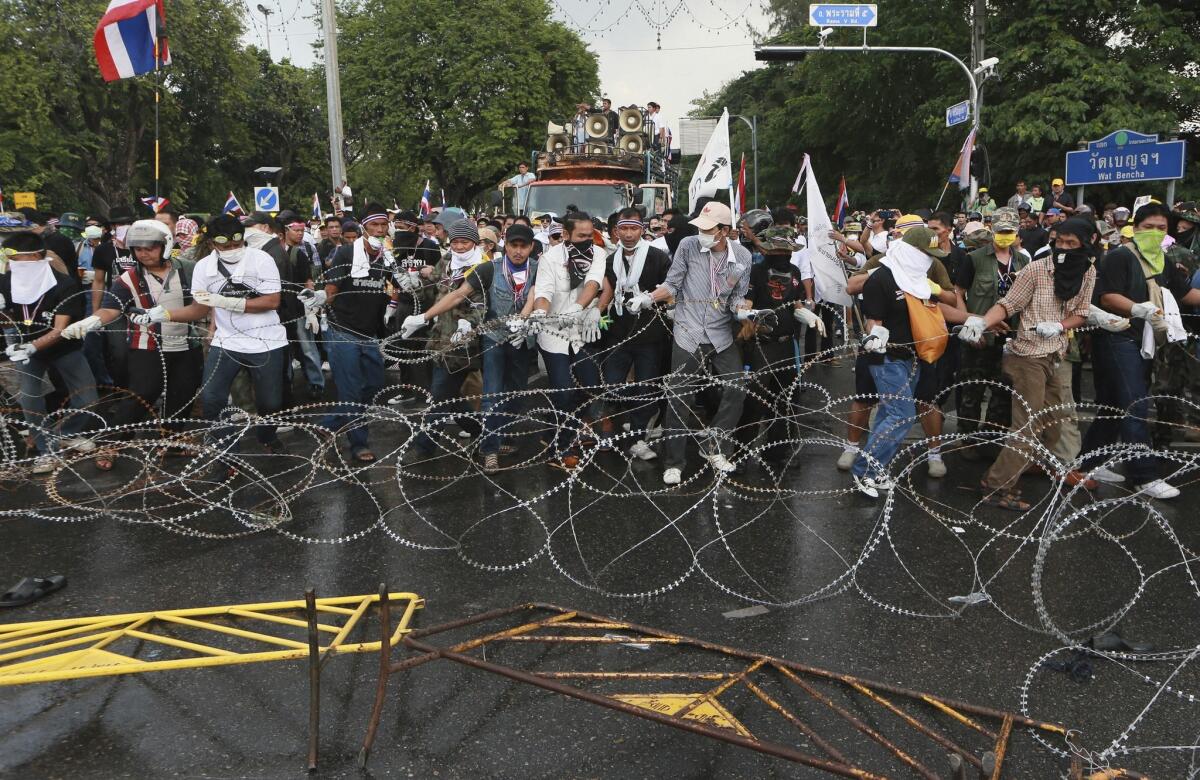Thailand protesters storm finance, foreign ministries

NEW DELHI -- Blowing whistles and calling for the prime minister to resign, anti-government demonstrators forced their way into Thailand’s finance and foreign ministries Monday, joining thousands who poured into the streets of the Thai capital of Bangkok for the second day in a row.
The protests were triggered by a controversial political-amnesty bill that critics say would have allowed ousted leader Thaksin Shinawatra to return to Thailand without being tried on corruption charges. Thaksin opponents say he continues to pull the strings from abroad through his youngest sister, current Prime Minister Yingluck Shinawatra.
Yingluck Shinawatra’s government has argued that the legislation is necessary for social and political reconciliation.
Although the bill failed to pass the Senate in early November, it fanned long simmering political divisions and raised the specter of a return to the violent protests seen in 2010, when large numbers of Thaksin Shinawatra’s supporters occupied parts of Bangkok for months. Dozens were killed in May of that year when the army staged a crackdown.
Following a massive protest Sunday that brought an estimated 100,000 people into the streets -- the largest since the 2010 protests -- demonstrators on Monday marched on government offices, the military headquarters and television stations, chanting, waving Thai flags and voicing their anger and frustration.
At the finance and foreign ministries, hundreds of people managed to get through security and into the compound.
[Updated, 7:15 a.m. PST Nov. 25: Yingluck Shinawatra invoked an emergency security law Monday night in large parts of Bangkok and surrounding areas, the Associated Press reported.
The Internal Security Act authorizes officials to seal off roads, take action against security threats, impose curfews and ban the use of electronic devices in designated areas. Peaceful rallies are allowed under the law.]
As protests have intensified in recent weeks, Yingluck Shinawatra has appealed for unity, calm and respect for the rule of law. “The government has instructed police and all security officers to handle the situation gently, based on international practices,” she said on her Facebook page, “so the demonstration won’t be used as a tool by people who want to make changes in a non-democratic way.”
Suthep Thaugsuban, a former lawmaker with the opposition Democratic Party, is heading the anti-Thaksin Shinawatra campaign. Suthep and other leaders have tried to ensure that the protests remain nonviolent under an anti-corruption, anti-Thaksin, anti-prime-minister banner. The tenor contrasts with 2010, when violence reigned and deep social divisions opened between prosperous urban pro-royalists known as yellow shirts and poor rural anti-royalist residents known as red shirts.
“It’s a different strategy,” said Kavi Chongkittavorn, assistant group editor of the Bangkok-based Nation media group. “You don’t see yellow color, only some red, and they’re going around giving out flowers. It’s been peaceful. I hope no one tries to make trouble.”
But given Thaksin’s polarizing effect on Thai politics and Thailand’s deep-seated social and economic divisions, it may be difficult to avoid confrontation, especially because pro-Thaksin red shirts have vowed to support the government. On Sunday, an estimated 40,000 red shirts gathered at Rajamangala Stadium, although so far they’ve kept their distance from anti-government crowds.
Analysts said they expect unrest to continue for several days until the prime minister and her ruling Puea Thai Party resign, protesters run out of steam or there’s a political breakthrough. The prime minister told local media Monday she would not dissolve parliament or resign even as trade unions have threatened to turn up the pressure by cutting off water and electricity to government ministries.
More than a dozen countries have issued travel warnings advising citizens to stay clear of the Bangkok protests. The city’s Suvarnabhumi International Airport advised passengers Monday to arrive three hours before departure time due to particularly bad traffic jams caused by the demonstrations.
Thaksin Shinawatra, a billionaire and former media tycoon, came into office in 2001 and became the first elected leader in Thai history to serve a full term and get reelected. The country has experienced 18 coups or attempted coups since 1932, when it became a constitutional monarchy.
But Thaksin -- strongly supported by Thailand’s poor who resent missing out on the nation’s prosperity, and hated by many of its rich -- was ousted in 2006 in a military coup, leading to a new constitution and years of protest that ended with the 2010 crackdown. In 2008, he was convicted on charges of corruption and abuse of power and given a two-year sentence. He denied the charges and fled rather than face imprisonment. He has remained overseas since, spending much of his time in Dubai.
Thailand has remained relatively calm since his sister became prime minister in 2011, but a fragile political truce has faded in recent weeks as the Democratic Party-led opposition flexed its muscle, vowing to remove the entire “Thaksin political machine.”
Analysts said Thaksin’s strategy was to get his sister elected, bide his time and return after several years to regain power, assuming the opposition had weakened. “I think the strategy’s failed,” Kavi said. “The protesters will continue to make life for the prime minister very difficult.”
ALSO:
Syria peace talks to begin Jan. 22, U.N. says
Afghan council defies Karzai on U.S. security deal
Egypt takes aim at protests, bans unapproved gatherings
More to Read
Sign up for Essential California
The most important California stories and recommendations in your inbox every morning.
You may occasionally receive promotional content from the Los Angeles Times.










